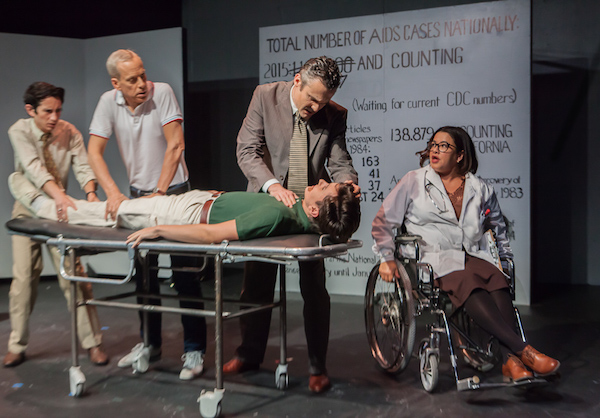ONSTAGE In the opening line of The Normal Heart (through Nov. 25, Theatre Rhinoceros at the Gateway Theater, SF), a young gay man in a hospital waiting room, turns to his friends and says, “I know something’s wrong.”
The line probably drew a different reaction when the play opened at Joseph Papp’s Public Theater in New York in 1985, the dawn of the AIDS epidemic. But at Theatre Rhino’s premier production of the drama, the audience had three decades of heartbreak and death and knew, yes, something was definitely wrong.
Yet after 30 years, Larry Kramer’s groundbreaking play still serves as a searing reminder of how the disease was ignored by public officials, the mainstream media, and the medical establishment even as the death toll climbed higher and higher.
The production is directed by John Fisher, who also plays the protagonist, Ned Weeks, a fictional rendition of Kramer himself.
Weeks, a writer who becomes a ferocious activist trying in every way to draw attention to the disease that is devastating the gay community, is played with just the right balance of braggadocio, compassion and abrasiveness. Early in the drama, Dr. Emma Brookner (Leticia Duarte), modeled on one of the first clinicians to detect that the deadly virus infecting gay males in New York was spread by sexual contact, tells Weeks she’s heard he has a big mouth. Ned counters, “Is a big mouth a symptom?”
“No,” she responds, “a cure.”

So even those audience members too young to personally remember Kramer’s take-no-prisoners advocacy, his founding of the Gay Men’s Health Crisis and ACT UP, become prepared to hear a lot of loud anger from him.
And Weeks delivers, fiercely denouncing the Mayor for ignoring the “mysterious gay cancer” and the New York Times for burying stories about it on the inside pages, when there are front-page headlines about the Tylenol scare and Legionnaires disease.
What is surprising it that Weeks’ rage is not only directed at his enemies, but his allies as well – especially the seemingly random group that gathers in Weeks’ living room to found an organization dedicated to fighting the disease. The well-calibrated harmony of this ensemble is the beating heart of the production: Bruce (Benoit Monin), a former Green Beret and now a closeted, well-heeled banker, Mickey (Tim Garcia), a health department writer who has fought for gay rights “since Stonewall,” and Tommy (Morgan Lange), a self-described “hospital administrator and Southern bitch.” Even as they send out their first mailing, Bruce worries about using the word “gay” in the return address on the envelope and Ned flies into a rage.
Ned becomes increasingly infuriated at their insistence on an incremental approach, seeking compromise with those who have ignored or betrayed them. He calls himself “the only screamer among them.” After one outburst where Ned excoriates the entire gay movement for its lack of focus on the disease, Mickey asks wryly, “Are you sure you didn’t leave anybody out?” Ned, like Kramer, is accused of being on “a colossal ego trip,” and eventually expelled from the group he founded.

But Ned’s life takes a turn when he falls in love – for the first time – with the urbane Felix (played with just the right amount of irony and flirtatiousness by Jeremy Cole), a closeted New York Times writer whom he tries to enlist for coverage in the paper. While wooing Felix, Ned’s fierce persona turns awkward and self-conscious; it’s an endearing transition that Fisher accomplishes seamlessly.
Although somewhat overwhelmed by Ned’s outsize personality, Felix reciprocates Ned’s affection and tries to frankly explain why he cannot be of help at his establishment paper. “I just write about gay designers and gay discos and gay chefs and gay rock stars and gay photographers and gay models and gay celebrities and gay everything. I just don’t call them gay.” In other words, he writes about everything “gay” except the lethal disease that is ravaging the community.
But Ned’s anger is contagious. By the second act, a year has passed and Dr. Brookner’s dire predictions of a plague have come true, with a death toll in the hundreds. Ned’s friends – those who have survived – have become increasingly infuriated and demoralized. Tommy reports a sorrowful scene of bringing an estranged mother to her son who was dying in Bellevue Hospital: “There are going to be a lot of mommas flying into town not understanding why their sons have suddenly upped and died from ‘pneumonia.’”
In one of the most gripping scenes, Mickey (Tim Garcia) reaches a tipping point when the phones are ringing off the hook and he can find no more volunteers. The calm, witty activist, grief-stricken by the loss of so many friends, is threatened with losing his city job because of his advocacy. His handsome face crumples into a grimace, his rational voice is choked with sobs. Flailing about, he shouts, “I can’t take any more theories. I’ve written about every single one of them. Repeated infection by a virus, new appearance by a dormant virus, single virus, new virus, old virus, multivirus, partial virus, latent virus, mutant virus, retrovirus…What if it’s something out of the blue? The Great Plague of London was caused by polluted drinking water from a pump nobody noticed!”

Mickey’s breakdown is echoed by Dr. Brookner who in the first act deals with the burgeoning health crisis in a detached scientific demeanor. She lashes out at the government funder for rejecting her research proposal, calls him an idiot, and in disgust throws her patients’ carefully organized medical records all over the stage.
Ned’s public anger and private anguish come together, as the handsome, polished Felix is ravaged by the disease, in an unforgettable scene where characters and groceries end up in chaos on the floor.
The scenic design (by Gilbert Johnson) has some effective elements and some bothersome ones. The projections at the beginning of each scene of New York Times headlines and articles are an important reminder of how little was known about HIV, its origins and its impact. But the crudely lettered white panels with statistics about the death toll and media coverage are unnecessary and distracting. Though the information is valuable, it is already available in the actors’ words.
Even more annoying are the actors’ clapping and chanting between scenes, sound effects that add neither meaning nor atmospherics. Is this some kind of male ritual? If it were just a device to cover scene changes, music would suffice.

But these shortcomings did not detract from the potency of this highly-charged play, and the passion and compassion that brought many in the audience to tears.
Kramer’s slice of life captures a crucial moment in history, when a mystery disease rapidly besieged the gay community, but was ignored by almost everyone else. As Ned bitterly states, “We’re living through war, but where they’re living it’s peacetime and we’re all in the same country.”
Today’s audiences know well the devastation of the AIDS epidemic – not only to the white male population in New York depicted in this play, but to women, communities of color, and people around the globe. I am not sure why Theatre Rhino, known as the “longest running queer theater in the world,” waited 30 years before staging The Normal Heart. But the power of Kramer’s fury has not diminished and Fisher and the company have staged a memorable version of a play that, sadly, seems to be timeless.
According to the World Health Organization, 35 million people have died of AIDS and an equal number are living with HIV infection, with the greatest prevalence in Africa. There is still no cure for AIDS.
The Normal Heart
Through November 25, $20-$40
Theatre Rhino at The Gateway Theatre (formerly Eureka Theater)
Tickets and more info here.
Need a car to get there? Rent one in your neighborhood on Getaround. Sign up today, and enjoy $50 off your first trip: http://get.co/48h. [Sponsored]







